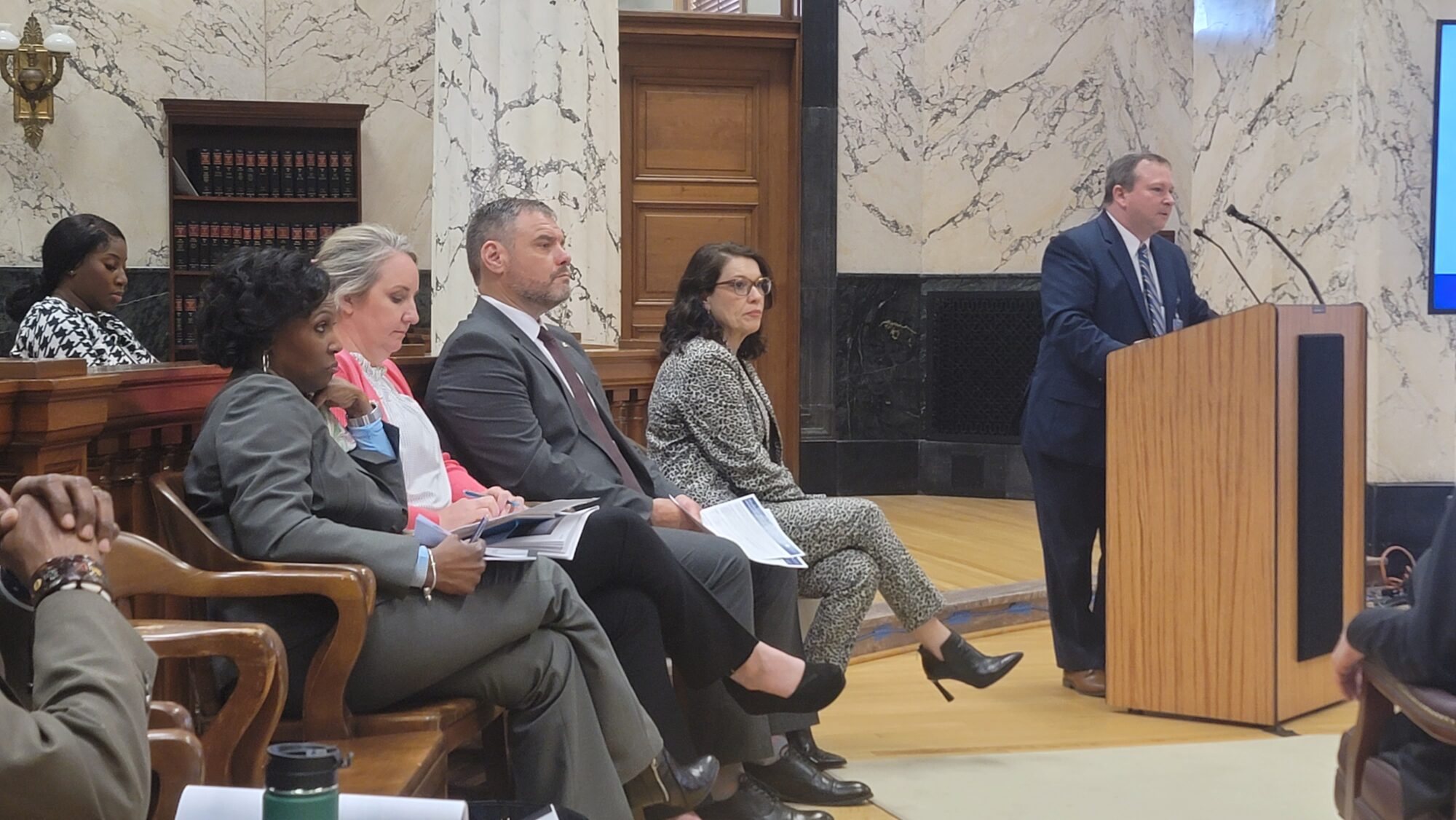
Senate Judiciary A Committee Chairman Brice Wiggins, R-Pascagoula, waves a letter asking for help to combat crime in Jackson, Miss., during his call for support for the controversial Jackson Capitol Complex Improvement District bill, Thursday, March 30, 2023, at the Capitol in Jackson, Miss. (AP Photo/Rogelio V. Solis - Copyright 2023 The Associated Press. All rights reserved.)
- The new plan would see three judges added to Chancery Districts and one judge lost in Circuit Districts.
The Mississippi Senate has presented its proposal for judicial redistricting as required by law based on the 2020 Census. Redistricting must be completed by 2025.
The plan was presented in the Senate Judiciary A Committee by State Senator Brice Wiggins (R), the committee chairman, and passed with little debate.
“A lot of work has been put into this,” said Wiggins. “This is not an easy process. I think once everybody looks at the plan that there’s a lot of good things here.”
Senator Wiggins assured members that there was a reverse repealer in the bill and along with the changes, districts have also been renumbered.
View the full proposal here
The main changes proposed in the Senate plan will remove one Circuit Court judge, leaving 54 across the state, and adding three Chancery Court judges for a total of 55. Lawmakers estimate these changes will cost the state roughly an additional $200,000 per judge.
Wiggins said in crafting the plan, one of the goals was to line up Chancery and Circuit courts, meaning the same counties are in Circuit Districts as are in Chancery Districts. The Senate strike-all amendment to HB 722 was able to align 80 to 85 percent of the districts.
The original House bill opened the code sections and added four additional judges in DeSoto County.
“The intent is to get our judicial districts lined up based on the data, based on regional differences and similarities, and make it such that our citizens have an efficient and good working judicial system,” said Wiggins.

RELATED: Lawmakers set to tackle judicial redistricting in Mississippi
Senate Wiggins said initial conversations have been very positive.
The Senate plan, if adopted, would not become active until January 1, 2027, for those judges elected in the fall 2026 election cycle. This would allow 18-months after passage for information to be circulated on changes made to the districts.
Currently, District Attorneys are connected to Circuit Courts and judges in those systems do not run for election at the same time as DA’s. Section 81 of the strike-all adopted by the Senate would allow for a five-year DA term, in order to get those court and DA terms in line. Terms would then reduce back to four years in future cycles.
Wiggins said it was an expectation of the committee to work to get rid of single judge, single districts. The new plan allows for every Chancery District to have at least two chancellors, and every Circuit District to have at least two judges, except for one district.

The new 16th District would be in Jackson County. They did not receive an additional judge but are maintaining their judges based on population growth.
Previously, Jackson County was required to pay 80 percent of the court systems for Green and George counties. In the current strike all, that is being repealed.
Senator Derrick Simmons (D) pointed out the changes to the 4th Circuit District which will be absorbed into the new 11th District. As it stands, the West portion of the 11th Circuit in the Delta covers Bolivar, Coahoma and Tunica, while the 4th District oversees Washington, Leflore and Sunflower.
Further clarification pointed out that the 4th District is being collapsed under the new plan, and with it those four judgeships, leaving three judges in the current 11th.
“Not that race should matter but it’s important because I’ve gotten a call from each of my judges, that out of those seven judges, three are white and four are black. As I understand it with the proposal, we would take those two circuits and combine them into one and reduce seven judges to three. Am I correct?” asked Senator Simmons.
Senator Wiggins acknowledged that the comments from the judges were valid, but lawmakers must look at the population shifts and caseloads across the state when redistributing judgeships.
“As I said in our joint committee meeting, there are judges who have an 80 caseload and judges who have a 1,400 or 1,500 caseload. Unfortunately, some of those are in the Delta. There is no blame to go around, it’s just what the numbers show,” said Wiggins.
Senator Wiggins said these changes are impacted mostly by sub-districts that are throughout the Delta. The new plan will retain some of those sub-districts, but their locations have been altered.
The 2020 Census shows population shifts occurred in Mississippi counties, including Quitman, Sharkey, Coahoma, and Tallahatchie where there was a decrease in residency. Other areas such as the coastal region, DeSoto, Lamar, Lafayette, Rankin and Madison counties saw increases over the previous 10-year period.
In 2015, seven new judgeships were created in the 12th Circuit, 13th Circuit, 15th Circuit, 20th Circuit, 4th Chancery, 11th Chancery, and 20th Chancery. These courts are located primarily in South and Central Mississippi.










